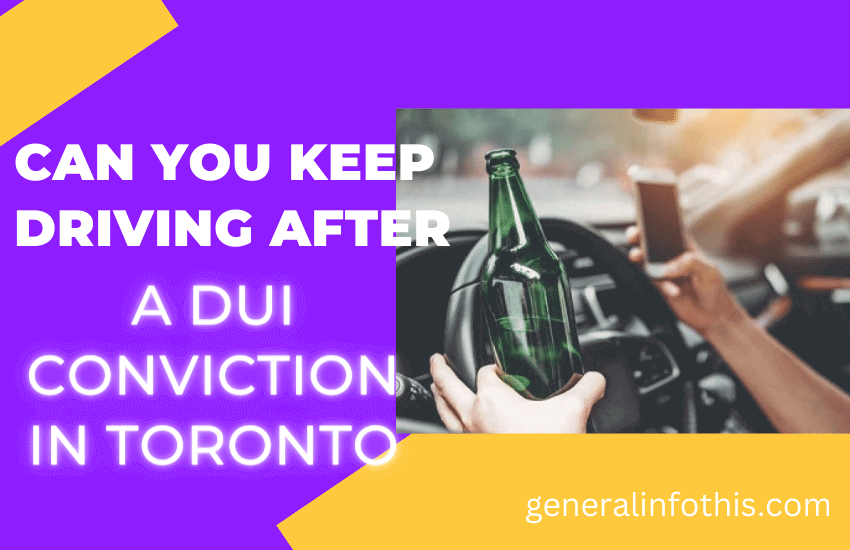Table of Contents
A DUI Lawyer in Toronto Explains the Consequences of a DUI Conviction
Have you been charged with driving under the influence and are looking for an experienced defence lawyer in Toronto? A DUI is a serious crime with serious consequences.
If you are convicted, you can expect your driver’s licence to be suspended and to pay a fine. You may also go to jail. Although sentences are usually short for first-time offenders, they increase for repeat offences.
In addition, you may lose your driving privileges. For many, driving is a necessity. So, you want to know whether you can continue driving after being charged with DUI.
In this post, we discuss the probable consequences of DUI charges and how long you must wait before you can get back on the road.
Can You Drive After a DUI Conviction? (A DUI Lawyer in Toronto Explains the Penalties)
Being charged with impaired driving is never good, especially if you are a first-time offender. You likely don’t know what to expect. How much of a fine do you need to pay? Is there any chance of imprisonment? How long will you be restricted from driving? Things can get even more complicated for repeat DUI offenders.
That’s why it is important to contact a DUI lawyer in Toronto who is familiar with the related local laws and can plan an appropriate legal strategy. Keep reading to learn about the consequences of a DUI charge and how they will affect your driving.
Driving Eligibility
Let’s start by addressing the primary concern of this post: whether you can drive after a DUI conviction.
The police will give you a 90-day administrative licence suspension on the day you are charged. Typically, if you are convicted of driving offences, you have to go through two licence suspensions: the first during the arrest and the second after conviction.
So, you cannot drive for 90 days. You are going to be given a court date anywhere from three to six weeks down the road (so to speak). So, now is the time to contact an experienced Toronto defence lawyer who can figure out the best way to present your case in court.
At the end of the 90 days, you will be able to go to the MTO (Ministry of Transportation) and get your licence back by paying a penalty. You are going to be able to drive up to your trial date. This is one of the benefits of setting your matter for trial, and if you win at trial, you can keep driving. But, if you lose, you may face additional penalties.
Fines and Other Financial Costs
If you are found guilty of driving under the influence, you will probably be fined. The fine for a first-time conviction for impaired driving in Ontario is a mandatory minimum of $1,000. The fine could be higher if there are aggravating circumstances.
This fine does not include the costs for court, treatment programmes, towing and impound, licence reinstatement, or costs related to renting, installing, and maintaining an ignition interlock device (IID).
Licence Suspension
A suspended licence is another unavoidable repercussion of a first-time DUI conviction. Your licence won’t be returned unless you fulfil specific requirements, and this can take up to a year. If you agree to have an ignition interlock device installed in your care, the length of the licence suspension can often be shortened. Keep in mind that you could be subject to both administrative and criminal penalties under the Criminal Code and the Ontario Highway Traffic Act. These suspensions may run concurrently.
As part of getting your licence reinstated, you will need to attend Ontario’s remedial measures program. This consists of educational and treatment workshops from the Back on Track Program. The program takes up to 11 months to complete, and you will be expected to fund it yourself at a current cost of $634. It also includes a mandatory follow-up interview six months after the workshops are completed, so you will need to take it seriously.
Higher Insurance Rates
Once you are convicted of a DUI, all insurance companies will place you in the high-risk bracket, so you can expect a significant increase in your premiums. In the worst cases, they may refuse to insure you or may triple your premiums on average, because drinking while driving is considered a violation of their policy terms.
Facility association insurance is an alternative. However, its premiums may be too high to be worthwhile.
Criminal Record
If you are found guilty, a criminal charge will be associated with your name. This can cause trouble, especially when applying for jobs or undergoing a background check. In Canada, your criminal record will be recorded in the Canadian Police Information Centre (CPIC) and police databases.
You can remove your criminal record from a background check by obtaining a record suspension or pardon. The latter requires at least five years to petition. But remember that even if you are ultimately found not guilty or don’t have a record, the DUI charge will remain on file with the police department.
These are some of the direct consequences of a DUI conviction. So, before you get behind the wheel after drinking, make sure you consider the consequences. Otherwise you will need to retain a reliable and experienced defence lawyer.














